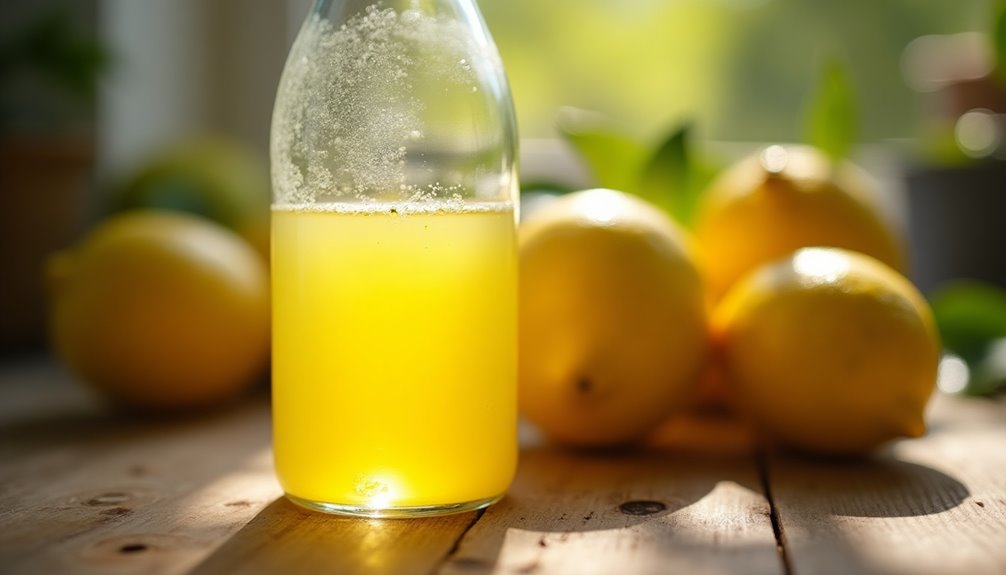Lemon juice can stay safe to use for several months past its expiration date if you store it properly in a cool, dark place. For unopened juice, many people find it usable for up to 1.5 years beyond the date. Once opened, refrigerate it, and it should last between 6 to 12 months. Freshly squeezed juice is different; it's best within 2 to 3 days. Curious about how to tell if your lemon juice has gone bad?
Key Takeaways
- Unopened lemon juice can be safe for several months beyond the expiration date if stored properly in a cool, dark place.
- Opened lemon juice typically lasts 6 to 12 months in the refrigerator after expiration, depending on storage conditions.
- Freshly squeezed lemon juice should be consumed within 2 to 3 days, as it spoils quickly without preservatives.
- Signs of spoilage include off smells, color changes, and mold growth; discard if any are present.
- Expiration dates reflect peak quality; many users successfully use lemon juice beyond these dates, but safety should be prioritized.

Have you ever wondered how long lemon juice stays good after its expiration date? It's a common question, especially when you find that unopened bottle of lemon juice hiding in the back of your pantry. If you store it properly in a cool, dark place, an unopened bottle of lemon juice can remain safe to use for several months beyond its expiration date. This means your store-bought juice likely retains its usability, even if the date on the label has long passed.
Once you open that bottle, the rules change a bit. Opened bottled lemon juice typically lasts between 6 to 12 months in the refrigerator after its expiration date, depending on the storage conditions and the integrity of the bottle. However, it's essential to keep an eye on how you store it. If you've left it out on the counter or in a warm area, you might notice a shorter shelf life. To ensure you're enjoying the best quality, always remember to keep it sealed tightly and refrigerated.
Now, let's talk about freshly squeezed lemon juice. This juice is a whole different ball game. Ideally, you should consume it within 2 to 3 days of juicing. Freshly squeezed lemon juice comes with a higher spoilage risk, so using it past its expiration date isn't recommended. You might think that if you can keep store-bought juice longer, the same would apply to freshly squeezed, but that's not the case. Fresh juice lacks preservatives, making it more prone to spoilage.
Even with store-bought lemon juice, while the expiration dates indicate peak quality, many consumers report successfully using lemon juice up to 1.5 years past the best-by date without any adverse effects. However, you should be aware that the flavor may start to deteriorate.
It's always best to trust your senses. Before using lemon juice that's past its expiration date, check for signs of spoilage. Look out for off smells, changes in color, or mold growth. If you notice any of these signs, it's better to toss it out to avoid any potential health risks.
Frequently Asked Questions
Can You Use Lemon Juice After the Expiration Date?
Yes, you can use lemon juice after the expiration date, but you should check its quality first.
If it's unopened and stored properly, it might still be good for a long time. Once opened, it usually lasts several months in the fridge.
Just look for any signs of spoilage, like off-odors or changes in color. If it seems fine, go ahead and use it in your recipes!
Can Bottled Lemon Juice Spoil?
Bottled lemon juice can seem like it's got magical powers, lasting way longer than you'd expect! However, it can spoil.
If you notice off smells, odd flavors, or any visible mold, it's time to toss it out. Proper storage is key; keep it sealed and refrigerated after opening.
Despite its acidity helping to stave off bacteria, always trust your senses to determine if it's still good to use.
How Long Is Lime Juice Good for After the Expiration Date?
Lime juice can remain safe for several months past its expiration date if you store it properly in a cool, dark place, and the bottle stays undamaged.
Once opened, it usually lasts about 6 to 12 months in the fridge.
Just keep an eye out for signs of spoilage like changes in color, off odors, or a sour taste.
If you notice any of these, it's best to toss it out.
How Do You Know if Lemon Has Gone Bad?
To know if lemon juice has gone bad, look for signs like visible mold, an off smell, or a change in color.
Fresh lemon juice should be clear and light yellow, so a cloudy appearance can indicate spoilage.
If you've left it out at room temperature for more than two hours, it's best to discard it.
Always trust your instincts—if you're unsure about its freshness, it's safer to throw it away.
Conclusion
In the grand symphony of culinary delights, lemon juice plays a vibrant note, even after its expiration date. While it may lose some of its zest over time, you can often use it for weeks or even months beyond the label's promise, as long as it's stored properly. Trust your senses; if it still dances with a fresh scent and flavor, feel free to squeeze it into your recipes, letting it brighten your dishes with its tangy brilliance.
Cindy thoroughly researches juicing trends, techniques, and recipes to provide readers with practical advice and inspiration. Her writing style is accessible, engaging, and designed to make complex concepts easy to understand. Cindy’s dedication to promoting the advantages of juicing shines through her work, empowering readers to make positive changes in their lives through the simple act of juicing.

















